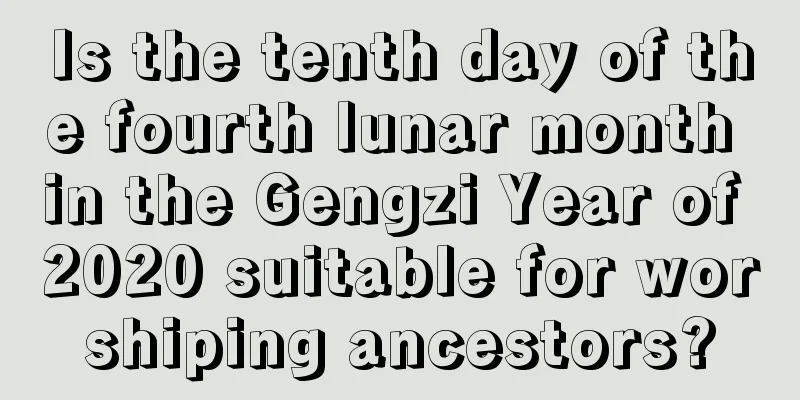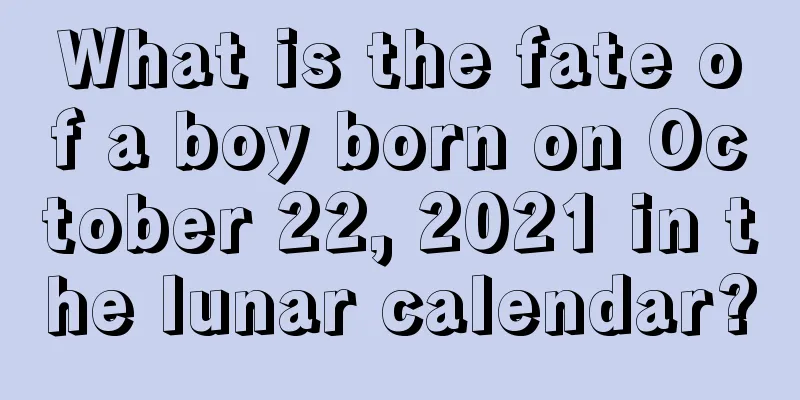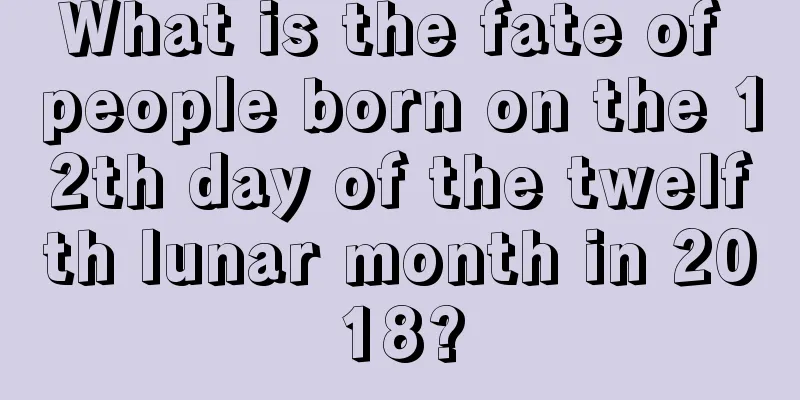What other customs are there during Qingming Festival besides tomb sweeping?

|
Introduction: I believe everyone knows a poem by the Tang Dynasty poet Du Mu: Rains fall heavily during the Qingming Festival, and pedestrians on the road are heartbroken. It expresses a kind of mourning for ancestors and deceased relatives! So what other customs do we have during the Qingming Festival besides tomb sweeping? Let’s follow the editor to learn more about it below! Various good days have appeared in the third month of the lunar calendar, and there are options for getting married or having children. People who work hard in March will reap the wonderful fruits of autumn. Qingming Festival, also known as the outing festival, is held at the turn of mid-spring and late spring, which is the 108th day after the winter solstice. It is a traditional Chinese festival and one of the most important festivals for worshipping ancestors. It is a day for worshipping ancestors and sweeping tombs. The two words "Qingming" originally mean clear and clean water and bright sun shining on all directions, which are the ancient Chinese people's observation of all things in nature. The earliest expression of the idea of the unity of man and nature reflected in the rituals of Qingming Festival is in the Book of Rites, Chapter 11 of Suburban Characteristics: "Yellow eyes represent the highest dignity of stagnant qi. Yellow means the center, and eyes represent the clarity of qi. It means that the qi is in the center and clear and bright outside." The most important thing is that people's appearance should be clear and bright during sacrifice. "Qingming" as a festival began around the pre-Qin to Western Han Dynasty, and later developed through the Han, Wei and Six Dynasties. In the Tang Dynasty, it was merged with Shangsi and Cold Food Festival. Therefore, it gathered many court and folk rituals and games, such as tug-of-war, rafting, tomb worship, fire changing, outing, swings, etc. During the Tang Dynasty, in order to show their affection and power, the royal family held a ceremony to bestow new fire in the morning light on the day of Qingming Festival. Other activities that continued to take place included palace maids going out to clean the city, ball-playing banquets for new scholars, and banquets bestowing wine on ministers. This shows that by the Tang Dynasty, the Qingming Festival celebrations had already appeared in a complete set. In addition to visiting graves and sweeping tombs, what other customs did the ancients have during the Qingming Festival?1. SacrificeQingming Festival was a day for ancient people to show their filial piety. The famous line of Du Mu, a great poet in the Tang Dynasty, "Rains fall heavily during the Qingming Festival, and pedestrians on the road are heartbroken", describes the scene of ancient people going out to sweep tombs and worship their ancestors. "The New Book of Tang Dynasty·Ritual and Music Volume 4·Paying Homage to the Tombs" records that "all the national tombs, from the imperial ancestors to the Taizu tomb, all offer sacrifices on the first and fifteenth day of the lunar month, and one sacrifice each on New Year's Day, Winter Solstice, Cold Food Day, Futu, La Festival, and Community Day." The Qingming Festival of the ancients included the emperor’s tomb worship, the princes and nobles’ tomb sweeping, the scholars and common people’s tomb worship and sacrifice, and the tomb worship activities during the Cold Food Festival and Qingming Festival. As Ennin said in "Travels in Tang Dynasty to Seek Dharma": "The seventeenth day is Cold Food Festival, and the day before and after is a total of three days off, when every family visits the tombs." This shows the importance the ancients attached to Qingming Festival.2. Change the fireIt was not easy to make fire in ancient times, so they had to keep the fire for use at any time. But a fire that burns for a long time is harmful to the body and may even cause disasters. Therefore, a fire-changing ceremony is held every year. When Qingming Festival comes, all things come back to life and a new year officially begins, so it is imperative to start a new fire. Therefore, during the Qingming Festival, China has the custom of "changing the fire". According to "Nianxia Sui Shi Ji", every year in Chang'an, "on Qingming Festival, the children of the officials in the inner garden of the Shangshi would drill for fire in front of the palace, and the one who got the fire first would present it to the emperor and be rewarded with three pieces of silk and a golden bowl". After getting the fire, all officials would light the torches under the corridor one by one, and then the emperor would start the ceremony of bestowing new fire.Han Hong of the Tang Dynasty wrote in "Cold Food": "Flowers are flying everywhere in the spring city, and the imperial willows are leaning in the east wind on Cold Food Day. At dusk, candles are lit in the Han Palace, and light smoke drifts into the homes of the five marquises." This is a description of this scene. Later, the "changing of fire" on Qingming Festival was combined with farming, and the "changing of fire" was linked to the old burning of fields, so that the changing of fire on Qingming Festival had the meaning of starting farming in spring, indicating that the new year had officially begun and people had to go to the fields to work. 3. Tug of WarTug of war was called "pulling hook" and "hooking strong" in the early days, and it was called "tug of war" in the Tang Dynasty. It was invented in the late Spring and Autumn Period, became popular in the army, and later spread to the people, but did not become popular. The grand tug-of-war culture really began during the reign of Emperor Xuanzong of Tang Dynasty, when a large-scale tug-of-war competition was held during the Qingming Festival. This made tug-of-war a part of the Qingming customs. The allegory is that holding tug-of-war during the Qingming Festival, when spring ploughing and planting are taking place, is meant to pray for a good harvest and to strengthen the body.4. Spring OutingThe spring scenery is at its best during the Qingming Festival. While sweeping tombs on Qingming Festival, the ancients also went out for fun in the spring. After the Song Dynasty, outing and enjoying the spring became popular during the Qingming Festival. In the third poem of Fan Chengda's "Pastoral Feelings in Spring", it says: "The wheat in the high fields meets the green mountains, and the low fields beside the water are green but unplowed; the village is full of peaches and apricots, like spring brocade, and the Qingming Festival is celebrated with singing and drums." It vividly describes the scene of outing on Qingming Festival. "Spring Outing" by Zhan Ziqian of the Sui Dynasty depicts the scene of aristocrats enjoying an outing in the countryside in spring.In the old days, women from city families did not go out easily. The Qingming outing provided an opportunity for "ladies" to engage in outdoor activities. Shao Changheng's poem "Yeyou" says: "In the middle of February, spring begins, and I invite female companions for an outing." This day is a day for them to release their youth and also a chance for them to meet their lovers. For example, in the Pingtan "The Legend of the White Snake", Xu Xian and Bai Niangzi fell in love at first sight during an outing on Qingming Festival, and thus performed a touching and inspiring love story. 5. Planting willows and wearing willowsIn ancient times, there were proverbs such as "If you don't plant willows on Qingming Festival, you will turn into a yellow dog after you die" and "If you don't wear willows on Qingming Festival, your beauty will turn into white hair." In the minds of the ancients, if you hang willow branches on the door, ghosts will not enter the house. Therefore, planting willow trees and wearing willow trees during Qingming Festival is mainly to ward off evil spirits. In addition, this custom also has the meaning of "recording age" in some places. This custom is a remnant of the Song Dynasty's capping ceremony. Men and women wearing willow balls is a sign of adulthood. Later, it evolved into a folk custom for women to wear willow balls on their temples to pray for eternal beauty.6. Flying a kitePeople fly kites not only for entertainment but also to get rid of bad luck. For example, in A Dream of Red Mansions, Li Wan advised Daiyu, "The purpose of flying kites is to have fun, that's why it is called flying kites to let go of bad luck. You should fly more kites to take away the root of your illness." Therefore, in spring when flowers bloom and the wind blows in February, it is the best time to fly kites. People write their illnesses and sufferings on kites, and when the kites are launched into the blue sky, they cut the strings and let them fly away with the wind.Flying kites during the Qingming Festival also has agricultural significance: before the Qingming Festival, at the beginning of spring, the wheat seedlings are in the seedling stage of growing roots and leaves, and the wheat fields are not afraid of being trampled, so children can play in them freely. Around the Qingming Festival, the wheat seedlings begin to grow stems and tiller, and cannot withstand heavy pressure and cannot be trampled. In the Suzhou area, there is a saying that "flying kites on Qingming is like flying turtles", which means that you can't fly kites after Qingming. Even children have to help adults with the busy farming season. If they still fly kites, they are like turtles and "not human". This is a kind of encouragement to children. After Qingming, it is the busy spring season and they have to help adults with work. 7. Eat cold foodThe Cold Food Festival is earlier than the Qingming Festival, but after the Tang Dynasty, the two gradually became confused. Some folklore experts said: Cold Food Festival is the day before Qingming Festival. Ancient people often extended the activities of Cold Food Festival to Qingming Festival. Over time, the two became one. There are different theories about the origin of Cold Food Festival. The most widely circulated one is that it is to commemorate Jie Zitui of Jin State during the Spring and Autumn Period. Jie Zitui followed Prince Chong'er of Jin State, also known as Duke Wen of Jin, into exile for 19 years. After returning to his country, Jie Zitui hid in the mountains. Chong'er set fire to the mountain in the hope of forcing Jie Zitui out, but instead burned him to death. In order to commemorate him, later generations banned fire, which formed the Cold Food Festival. During the late Ming and Qing dynasties, fire was no longer banned during the Cold Food Festival, and the custom of eating Cold Food was gradually abolished.8. SwingQingming Festival is also called the "Swing Festival". Swinging has been popular during the Southern and Northern Dynasties. Since the Tang Dynasty, it has become popular across the country through official promotion. The swing was originally called Qianqiu, but later it was changed to "swing" to avoid taboos. In ancient times, swings were mostly made of tree branches as frames, and then tied with ribbons. Later, it gradually developed into a swing with two ropes and pedals. In ancient times, people swung on a swing mainly to improve their health and cultivate courage. However, in a poem titled Xiang De by Han Wei from the Tang Dynasty, it goes like this: "In front of the jade hall behind the double doors, there are flowers on the Cold Food Festival and the moon is at noon. I imagine that person standing with his hands hanging down, too shy to get on the swing." Imagining the shy look of the person inside the wall "refusing to get on the swing" from the other side of the wall increases the imagination of this activity.9. Planting treesSince ancient times, my country has had the custom of planting trees on Qingming Festival. Even in a document titled "Report on the Tree Planting Situation on Qingming Festival in the Seventh Year and Request for Approval of Expenses" in the seventh year of the Republic of China, it was stated that "a tree planting ceremony should be held on Qingming Festival every year, and it should be established as a rule." This shows that Qingming Festival was also Arbor Day during the Republic of China.Around the Qingming Festival, the spring sun shines and the spring rain falls, so the survival rate of planted seedlings is high and they grow fast. Therefore, there is a proverb during the Qingming Festival: "Plant melons and beans around the Qingming Festival." During the Qingming Festival, people like to plant pine and cypress trees in front of tombs to express their thoughts and miss their deceased relatives. In Taiwan and southern Fujian, people like to plant acacia trees to give their deceased relatives a home and the living people a place to put their thoughts and miss them. 10. CujuCuju is the predecessor of today's football. The ball cover is made of leather and the inside of the ball is stuffed with hair. According to legend, Cuju has existed since the Shang Dynasty, spread to the people during the Warring States Period, and became a method of physical training and martial arts practice in the military during the Han Dynasty, and was listed in military books. In the "Famous Capitals" by Cao Zhi of the Three Kingdoms, there is a line "Continuously hitting the ground with balls".Cuju was most prosperous during the Tang and Song dynasties. It was common to see scenes such as "the ball never falls" and "the ball never leaves the feet, the feet never leave the ball, the court is watched and tens of thousands of people admire it". In the Tang Dynasty poem "Qingming" by Du Fu, it was written that "ten years of Cuju have brought the young players far away, but the custom of swings is the same thousands of miles away", which shows the popularity of this activity. In the Song Dynasty, it became even more popular. In the well-known "Water Margin", Gao Qiu was appreciated by the Song Dynasty emperor for his outstanding kicking skills. The Song Dynasty loved playing football, which is also reflected in the ancient painting "Song Taizu Cuju". 11. CockfightingThe games on Qingming Festival focus on noise. Cockfighting was popular among the ancients on Qingming Festival. The cockfighting lasted for a long time, starting from Qingming Festival and lasting until the summer solstice. The earliest record of cockfighting in my country can be found in Zuo Zhuan. In the Tang Dynasty, cockfighting became a trend. Not only did ordinary people fight cockfights, but even the emperor participated in cockfighting. For example, Emperor Xuanzong of Tang loved cockfighting the most. Cockfighting competitions were held in the palace, and 10 red silk quilts were used as stakes, which shows how popular the cockfighting game was. Lady Huarui, a female poet from the Five Dynasties, described this in a poem: "During the Cold Food Festival and Qingming Festival, next to the small hall, there are colorful pavilions flanking the cockfighting arena. The ladies look clearly at the emperor, and they get a glimpse of the ten red silk quilts first."12. Shooting the willowArchery is a fashionable and elegant activity. The ancients emphasized the simultaneous development of the six arts of "ritual, music, archery, charioteering, calligraphy, and mathematics", and archery was one of them. Archery is a sport in which a piece of red silk is tied to a slender, swaying willow branch. The target is usually a young man who rides a horse and draws a bow. From a hundred steps away, he uses a specially made arrow with a fork at the front to shoot off the willow branch. Before the branch falls to the ground, he rides his horse over and catches it. This is a sport that tests one’s riding and archery skills.As the game developed, the specific rules of the game changed. According to records from the Ming Dynasty, willow shooting was to put a pigeon in a gourd, then hang the gourd high on a willow tree, shoot the gourd with a bow, and the pigeon would fly out. The winner would be determined by the height at which the pigeon flew. In this way, the uncertainty of the game increases, but the difficulty of the game is also reduced. Summary: The above are some other customs and activities during the Qingming Festival besides tomb sweeping. You can refer to them and participate in them during the Qingming holiday! I hope you like the above content! |
>>: How to properly sweep graves during Qingming Festival? What are the rules and taboos?
Recommend
Is June 1, 2020, Children's Day, a good date in the lunar calendar? Is it suitable for a haircut?
Introduction: Sometimes you have to choose an ausp...
Is the seventh day of the eighth lunar month in 2018 an auspicious day for signing a contract?
The reason for choosing an auspicious day to sign ...
Is it a good idea to pick up the car on October 15th of the lunar calendar in 2019?
People have always been accustomed to following t...
Analysis on how to find your peach blossom position from all aspects
Introduction: How to determine the peach blossom ...
What can’t you do on Grain Full in 2022? What are the taboos on Grain Full Day?
Grain Full is one of the solar terms in early summ...
How about August 22nd of the lunar calendar in 2020? What day is it?
The eighth month of the lunar calendar is also kn...
How will the third day of June be in the Year of the Ox 2021? Is it an auspicious day?
The old almanac has been used in our country for t...
Is April 20, the day after Grain Rain in 2020, a good day for engagement?
Introduction: It is important to choose an auspici...
Is it a good idea to open the company on the fourth day of the twelfth lunar month in 2019?
Is it a good idea to open the company on the four...
Is it suitable to pick up a car on the first day of the tenth month of the lunar calendar in the Year of the Rat 2020, the Cold Clothes Festival?
The tenth month of the lunar calendar is now also...
How to maintain health during the Jingzhe solar term and what should we pay attention to?
With the improvement of living standards, people p...
Is it good to give birth to a boy on November 21, 2017 in the lunar calendar? Is the time on November 21st in the lunar calendar auspicious or inauspicious?
A baby is the fruit of his parents’ love, and the ...
Is it appropriate to bury the dead on the eighth day of the twelfth lunar month in 2021? How many days are left until the Great Cold in 2021?
Introduction: Burial generally requires choosing a...
What day of the Gregorian calendar is October 12, 2019?
What day of the Gregorian calendar is October 12,...
What kind of plants are best placed in the study to improve career fortune?
Introduction: The study room is perfect for those...









